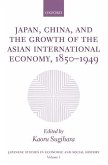Masataka BannoVolume 1: The State or the Market?
The Political Economy of Japanese Society
Volume 1: The State or the Market?
Herausgeber: Banno, Junji; Banno, Masataka
Masataka BannoVolume 1: The State or the Market?
The Political Economy of Japanese Society
Volume 1: The State or the Market?
Herausgeber: Banno, Junji; Banno, Masataka
- Gebundenes Buch
- Merkliste
- Auf die Merkliste
- Bewerten Bewerten
- Teilen
- Produkt teilen
- Produkterinnerung
- Produkterinnerung
This informative, multidisciplinary study provides an in-depth and authoritative analysis of the current state of one of the most important and influential societies and economies since the war.
Andere Kunden interessierten sich auch für
![The Political Economy of Japanese Society The Political Economy of Japanese Society]() Masataka BannoThe Political Economy of Japanese Society188,99 €
Masataka BannoThe Political Economy of Japanese Society188,99 €![The Mit Encyclopedia of the Japanese Economy The Mit Encyclopedia of the Japanese Economy]() Robert C. HsuThe Mit Encyclopedia of the Japanese Economy11,99 €
Robert C. HsuThe Mit Encyclopedia of the Japanese Economy11,99 €![Inequality and the State Inequality and the State]() John HillsInequality and the State85,99 €
John HillsInequality and the State85,99 €![F. Y. Edgeworth's Mathematical Psychics and Further Papers on Political Economy F. Y. Edgeworth's Mathematical Psychics and Further Papers on Political Economy]() Francis Ysidro EdgeworthF. Y. Edgeworth's Mathematical Psychics and Further Papers on Political Economy385,99 €
Francis Ysidro EdgeworthF. Y. Edgeworth's Mathematical Psychics and Further Papers on Political Economy385,99 €![Japan, China, and the Growth of the Asian International Economy, 1850-1949 Japan, China, and the Growth of the Asian International Economy, 1850-1949]() Kaoru Sugihara (ed.)Japan, China, and the Growth of the Asian International Economy, 1850-1949313,99 €
Kaoru Sugihara (ed.)Japan, China, and the Growth of the Asian International Economy, 1850-1949313,99 €![Internationalization and Economic Institutions Internationalization and Economic Institutions]() Mark ThatcherInternationalization and Economic Institutions183,99 €
Mark ThatcherInternationalization and Economic Institutions183,99 €![Modelling the Middle Ages Modelling the Middle Ages]() John HatcherModelling the Middle Ages140,99 €
John HatcherModelling the Middle Ages140,99 €-
-
-
This informative, multidisciplinary study provides an in-depth and authoritative analysis of the current state of one of the most important and influential societies and economies since the war.
Hinweis: Dieser Artikel kann nur an eine deutsche Lieferadresse ausgeliefert werden.
Hinweis: Dieser Artikel kann nur an eine deutsche Lieferadresse ausgeliefert werden.
Produktdetails
- Produktdetails
- Verlag: Oxford University Press (UK)
- Seitenzahl: 378
- Erscheinungstermin: 8. Januar 1998
- Englisch
- Abmessung: 234mm x 156mm x 22mm
- Gewicht: 703g
- ISBN-13: 9780198280330
- ISBN-10: 0198280335
- Artikelnr.: 62664808
- Herstellerkennzeichnung
- Libri GmbH
- Europaallee 1
- 36244 Bad Hersfeld
- gpsr@libri.de
- Verlag: Oxford University Press (UK)
- Seitenzahl: 378
- Erscheinungstermin: 8. Januar 1998
- Englisch
- Abmessung: 234mm x 156mm x 22mm
- Gewicht: 703g
- ISBN-13: 9780198280330
- ISBN-10: 0198280335
- Artikelnr.: 62664808
- Herstellerkennzeichnung
- Libri GmbH
- Europaallee 1
- 36244 Bad Hersfeld
- gpsr@libri.de
* Volume 1: The State or the Market?
* Introduction: The Historical Origins of Companyism: From
Westernization to Indigenization
* Part 1: Structure
* 1: Hashimoto Juro: Corporate Structure and the Japanese Economy
* 2: Yamazaki Hiroaki: Introduction to Japanese Company History:
Stability and Change in the Ranking of Large Manufacturing
Enterprises
* 3: Tabata Hirokuni: Industrial Relations and the Union Movement
* 4: Watanabe Osamu: The Weakness of the Contemporary Japanese State
* 5: Baba Hiroji: Japanese Companyism and the End of the Cold War
* Part 2: Historical Origins
* 6: Narusawa Akira: The Social Order of Modern Japan
* 7: Nishida Yoshiaki: Labour and Farmers' Movements in Pre-War Japan
* 8: Okazaki Tetsuji: The Wartime Institutional Reforms and
Transformation of the Economic System
* Volume 2: Internationalization and Domestic Issues
* Part 1: Internationalization
* 1: Kawai Masahiro: Japan as Creditor Nation: What is happening to its
Net External Assets
* 2: Koike Kazuo: The Internationalization of the Japanese Firm:
Japanese Working Practices and Indigenous Asian Workplaces
* 3: Hirowatari Seigo: Foreign Workers and Immigration Policy
* 4: Wada Haruki: Economic Co-operation in Place of Historical Remorse:
Japanese Post-War Settlements with China, Russia, and Korea in the
Context of the Cold War. Normalizing Relations with the Soviet Union,
China, and South Korea
* Part 2: Domestic Issues
* 5: Osawa Mari: The Feminization of the Labour Market
* 6: Harada Sumitaka: The Aging Society, the Family, and Social Policy
* 7: Inamoto Yonosuke: The Problem of Land Use and Land Prices
* Part 3: Facing the Post-Cold War/Post-Bubble World
* 8: Nitta Michio: Employment Relations after the collapse of the
Bubble Economy
* 9: Hiwatari Nobuhiro: The Argument: Explaining the End of the
Post-war Party System
* Introduction: The Historical Origins of Companyism: From
Westernization to Indigenization
* Part 1: Structure
* 1: Hashimoto Juro: Corporate Structure and the Japanese Economy
* 2: Yamazaki Hiroaki: Introduction to Japanese Company History:
Stability and Change in the Ranking of Large Manufacturing
Enterprises
* 3: Tabata Hirokuni: Industrial Relations and the Union Movement
* 4: Watanabe Osamu: The Weakness of the Contemporary Japanese State
* 5: Baba Hiroji: Japanese Companyism and the End of the Cold War
* Part 2: Historical Origins
* 6: Narusawa Akira: The Social Order of Modern Japan
* 7: Nishida Yoshiaki: Labour and Farmers' Movements in Pre-War Japan
* 8: Okazaki Tetsuji: The Wartime Institutional Reforms and
Transformation of the Economic System
* Volume 2: Internationalization and Domestic Issues
* Part 1: Internationalization
* 1: Kawai Masahiro: Japan as Creditor Nation: What is happening to its
Net External Assets
* 2: Koike Kazuo: The Internationalization of the Japanese Firm:
Japanese Working Practices and Indigenous Asian Workplaces
* 3: Hirowatari Seigo: Foreign Workers and Immigration Policy
* 4: Wada Haruki: Economic Co-operation in Place of Historical Remorse:
Japanese Post-War Settlements with China, Russia, and Korea in the
Context of the Cold War. Normalizing Relations with the Soviet Union,
China, and South Korea
* Part 2: Domestic Issues
* 5: Osawa Mari: The Feminization of the Labour Market
* 6: Harada Sumitaka: The Aging Society, the Family, and Social Policy
* 7: Inamoto Yonosuke: The Problem of Land Use and Land Prices
* Part 3: Facing the Post-Cold War/Post-Bubble World
* 8: Nitta Michio: Employment Relations after the collapse of the
Bubble Economy
* 9: Hiwatari Nobuhiro: The Argument: Explaining the End of the
Post-war Party System
* Volume 1: The State or the Market?
* Introduction: The Historical Origins of Companyism: From
Westernization to Indigenization
* Part 1: Structure
* 1: Hashimoto Juro: Corporate Structure and the Japanese Economy
* 2: Yamazaki Hiroaki: Introduction to Japanese Company History:
Stability and Change in the Ranking of Large Manufacturing
Enterprises
* 3: Tabata Hirokuni: Industrial Relations and the Union Movement
* 4: Watanabe Osamu: The Weakness of the Contemporary Japanese State
* 5: Baba Hiroji: Japanese Companyism and the End of the Cold War
* Part 2: Historical Origins
* 6: Narusawa Akira: The Social Order of Modern Japan
* 7: Nishida Yoshiaki: Labour and Farmers' Movements in Pre-War Japan
* 8: Okazaki Tetsuji: The Wartime Institutional Reforms and
Transformation of the Economic System
* Volume 2: Internationalization and Domestic Issues
* Part 1: Internationalization
* 1: Kawai Masahiro: Japan as Creditor Nation: What is happening to its
Net External Assets
* 2: Koike Kazuo: The Internationalization of the Japanese Firm:
Japanese Working Practices and Indigenous Asian Workplaces
* 3: Hirowatari Seigo: Foreign Workers and Immigration Policy
* 4: Wada Haruki: Economic Co-operation in Place of Historical Remorse:
Japanese Post-War Settlements with China, Russia, and Korea in the
Context of the Cold War. Normalizing Relations with the Soviet Union,
China, and South Korea
* Part 2: Domestic Issues
* 5: Osawa Mari: The Feminization of the Labour Market
* 6: Harada Sumitaka: The Aging Society, the Family, and Social Policy
* 7: Inamoto Yonosuke: The Problem of Land Use and Land Prices
* Part 3: Facing the Post-Cold War/Post-Bubble World
* 8: Nitta Michio: Employment Relations after the collapse of the
Bubble Economy
* 9: Hiwatari Nobuhiro: The Argument: Explaining the End of the
Post-war Party System
* Introduction: The Historical Origins of Companyism: From
Westernization to Indigenization
* Part 1: Structure
* 1: Hashimoto Juro: Corporate Structure and the Japanese Economy
* 2: Yamazaki Hiroaki: Introduction to Japanese Company History:
Stability and Change in the Ranking of Large Manufacturing
Enterprises
* 3: Tabata Hirokuni: Industrial Relations and the Union Movement
* 4: Watanabe Osamu: The Weakness of the Contemporary Japanese State
* 5: Baba Hiroji: Japanese Companyism and the End of the Cold War
* Part 2: Historical Origins
* 6: Narusawa Akira: The Social Order of Modern Japan
* 7: Nishida Yoshiaki: Labour and Farmers' Movements in Pre-War Japan
* 8: Okazaki Tetsuji: The Wartime Institutional Reforms and
Transformation of the Economic System
* Volume 2: Internationalization and Domestic Issues
* Part 1: Internationalization
* 1: Kawai Masahiro: Japan as Creditor Nation: What is happening to its
Net External Assets
* 2: Koike Kazuo: The Internationalization of the Japanese Firm:
Japanese Working Practices and Indigenous Asian Workplaces
* 3: Hirowatari Seigo: Foreign Workers and Immigration Policy
* 4: Wada Haruki: Economic Co-operation in Place of Historical Remorse:
Japanese Post-War Settlements with China, Russia, and Korea in the
Context of the Cold War. Normalizing Relations with the Soviet Union,
China, and South Korea
* Part 2: Domestic Issues
* 5: Osawa Mari: The Feminization of the Labour Market
* 6: Harada Sumitaka: The Aging Society, the Family, and Social Policy
* 7: Inamoto Yonosuke: The Problem of Land Use and Land Prices
* Part 3: Facing the Post-Cold War/Post-Bubble World
* 8: Nitta Michio: Employment Relations after the collapse of the
Bubble Economy
* 9: Hiwatari Nobuhiro: The Argument: Explaining the End of the
Post-war Party System








